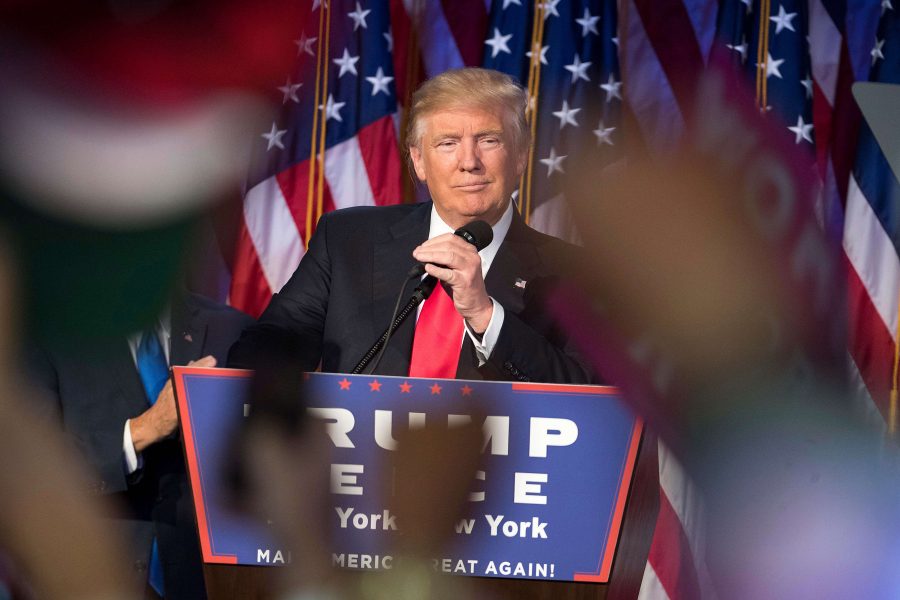Donald Trump wins presidential election in unexpected victory
(J. Conrad Williams Jr./Newsday/TNS)
President-elect Donald Trump speaks to supporters at the Election Night Party at the Hilton Midtown Hotel in New York City on Wednesday, Nov. 9, 2016.
November 9, 2016
In a shocking upset, Donald Trump won the presidential election held Tuesday, riding widespread discontent with political elites to become a president-elect unlike any other in American history.
The victory will make the billionaire entrepreneur the first commander-in-chief never to have held a government office or served in the military, halting Democratic nominee Hillary Clinton’s bid to become the nation’s first woman president.
Trump’s victory shocked political observers who had predicted a victory for Clinton, a former secretary of state and first lady. But Clinton fell short in crucial states, including some projected to go blue such as Pennsylvania, Wisconsin and Michigan.
Trump said Clinton called him and conceded the race, adding in his victory speech that the United States owed her a “major debt of gratitude” for her service to the country. Clinton has not yet given a concession speech.
During his speech, Trump also praised his supporters.
“Ours was not a campaign but rather an incredible and great movement, made up of millions of hard-working men and women who love their country and want a better, brighter future for themselves and for their family,” Trump said after taking the stage just before 2 a.m. Wednesday morning at his headquarters in New York City.
Along with the White House, the Republican Party will control both houses of Congress, having retained enough contested Senate seats. It is the first time in a decade that the GOP will control both the executive and legislative branches.
After railing against free trade throughout the campaign, Trump captured much of the Rust Belt, including surprise wins in Michigan and Wisconsin. Trump dominated in states that were considered “toss-ups,” such as Florida and North Carolina. He also won at least five states President Barack Obama won in 2012: Wisconsin, Pennsylvania, Iowa, Florida and Ohio.
Some pundits speculated that third-party votes for Green Party candidate Jill Stein and Libertarian candidate Gary Johnson may have helped Trump pull off the upset. In multiple states, Stein and Johnson’s share of votes was larger than the margin between Trump and Clinton.
To win his party’s nomination, Trump defeated 16 Republican candidates, topping the well-funded, sophisticated campaigns of Texas Sen. Ted Cruz, Florida Sen. Marco Rubio and former Florida Gov. Jeb Bush. Though Trump’s campaign was initially laughed off by many pundits, and was later opposed by a “Never Trump” movement organized by some in the Republican establishment, Trump went on to win 33 states in the Republican primaries. He focused his campaign on an uncensored, nationalistic message, proposing the United States build a wall along the southern border with Mexico and ban Muslims from entering the country.
In October, The Washington Post published footage of Trump talking about grabbing women’s genitals and kissing them without consent. In the days after, at least eight women publicly alleged Trump had sexually assaulted them. Trump defended himself during the last two televised debates, in part by pointing to sexual assault allegations against former President Bill Clinton.
The allegations against Trump followed him throughout October, but days before the election, Clinton’s poll numbers dropped when the FBI reopened an investigation involving her private email server. The renewed investigation came after related emails were found on a computer belonging to Anthony Weiner, the now-separated husband of Clinton aide Huma Abedin. FBI director James Comey announced Sunday that the agency hadn’t changed its stance that the candidate should not face criminal charges.
Trump threatened in October to try to put Clinton in prison if he were elected. At Trump’s rallies — and at the Republican National Convention — his supporters frequently erupted in chants of “lock her up,” with the candidate sometimes encouraging them.
Trump’s victory punctuates a bitterly polarized election and a summer roiled by violence inside and outside the country. Terrorist attacks, as well as shootings of and by police, created a climate of fear that some say fueled support for Trump.
Although a number of establishment Republicans such as New Jersey Gov. Chris Christie stood by Trump, many in the GOP such as House Speaker Paul Ryan refused to endorse him for much of his candidacy. Others — such as unseated Illinois Sen. Mark Kirk — openly rejected their party’s nominee.
Many of Trump’s supporters say they supported him because of his anti-establishment rhetoric and his stance opposing international trade and immigration. Trump has also garnered the support of many domestic extremist groups, including the Ku Klux Klan, neo-Nazis and alt-right white nationalists.
Yet, in his victory speech early Wednesday, Trump called on the country to look forward.
“To all Republicans and Democrats and independents across this nation, I say it is time for us to come together as one united people,” Trump said.
Email: [email protected]
Twitter: @juliarebeccaj
Email: [email protected]
Twitter: @shane_mckeon
Email: [email protected]
Twitter: @robinlopsahl


